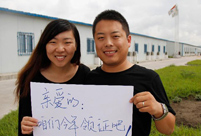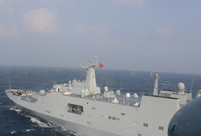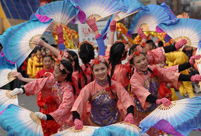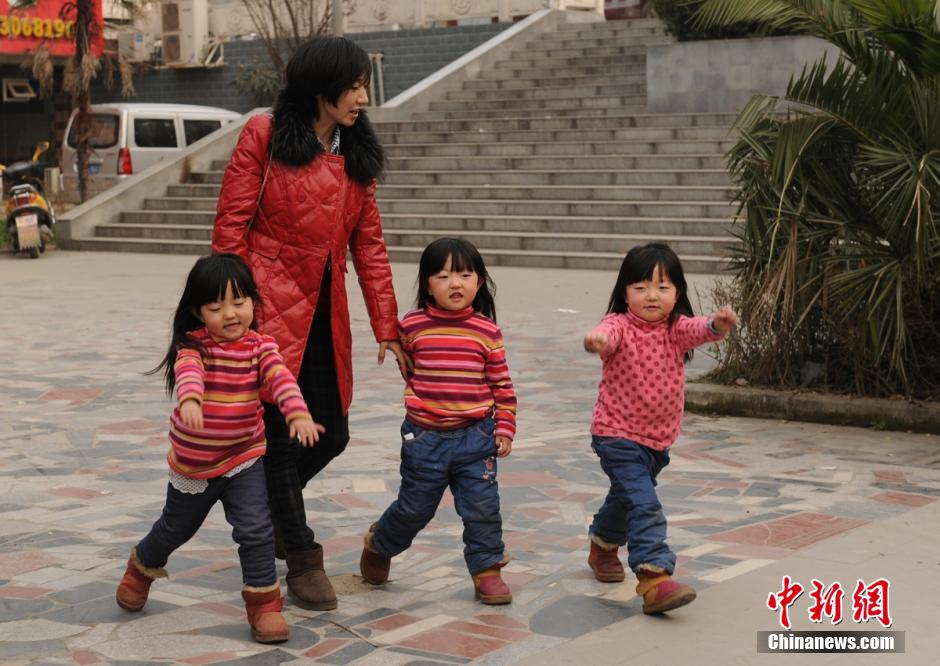 Cockfighting show staged in E. China's Heze during Spring Festival
Cockfighting show staged in E. China's Heze during Spring Festival
 Chinese New Year Flower Fair opens in San Francisco
Chinese New Year Flower Fair opens in San Francisco
 Festivities in Shanghai
Festivities in Shanghai
 PLA navy conducts drill in North China Sea
PLA navy conducts drill in North China Sea
 World's high-tech hotels
World's high-tech hotels
 Li Na poses with trophy on Brighton Beach in Melbourne
Li Na poses with trophy on Brighton Beach in Melbourne
 Six Chinese divers back safely after 300-meter saturation dive
Six Chinese divers back safely after 300-meter saturation dive
 Traditional wedding ceremony of Yao people
Traditional wedding ceremony of Yao people
 Taipei Game Show attracts geeky gamers
Taipei Game Show attracts geeky gamers
BEIJING, Feb. 7 -- Recent events have demonstrated that while China sincerely share neighbors' joy in making achievements, it never hesitates to safeguard peripheral peace and security.
When Chinese President Xi Jinping arrived in Russia to attend the opening ceremony of the Sochi Winter Olympic Games, he told Russian counterpart Vladimir Putin that he came to offer his congratulations in person, as is customary for Chinese to do upon their neighbors' joyous occasions.
As the games serve as a symbol that Russia is on its way to prosperity, the attendance of the sporting event by a Chinese president signals China's support for Russia's development and stronger ties between the two countries under their comprehensive strategic cooperative partnership.
The two neighboring nations have also worked closely on major international and regional issues, including the joint mission of escorting the shipments of Syria's chemical weapons.
The Sino-Russian relationship has set a good example of China's regional diplomacy, the core of which is to treat neighbors as friends and partners and help them to develop.
Besides Russia, the new Chinese leadership has visited more than a dozen neighboring countries to build mutual trust, deepen cooperation and seek closer integration of China's interests with those of its neighbors.
But this neighborly friendship leaves no room for threats to China's peripheral peace and security.
China welcomes the development of its neighbors, but opposes any attempt to expand power by disrupting regional peace and order.
Regrettably, for their selfish purposes, some countries in the region chose to ignore history and international law, inciting territorial disputes with China and disturbing peace and development of the Asia-Pacific region.
Recently, Japan has continuously irritated its neighbors and even U.S. allies by attempting to downplay its fascist history and revise a pacifist constitution to make overseas deployment of soldiers possible.
After Japanese Prime Minister Shinzo Abe's visit to the Yasukumi Shrine that honors 14 class-A war criminals, the country disappointed the world again as Naoki Hyakuta, a member of the NHK board of governors, denied the Nanjing Massacre ever happened.
These actions and words have sent worrisome signals that political speculators in the island country are developing into rightist forces, and they have given Japan's neighbors every reason to be highly vigilant and concerned over the road Japan will take in the future.
Thus, it is necessary for China and Russia to hold activities to commemorate the 70th anniversary of victories in the World Anti-Fascist War and Anti-Japanese War in 2015, so as to remember history and educate future generations.
As Putin said, the Nazi forces' aggression toward European countries including the Soviet Union, and the serious crimes committed by the Japanese imperialist military in China and other Asian countries should not be forgotten.
China will never pursue development at the cost of other countries' interests. But in the wake of provocations, China has the right to adopt all measures to safeguard national security and unite with neighbors to protect regional peace.
 Special Coverage: Sochi Winter Olympic Games
Special Coverage: Sochi Winter Olympic Games  A day of a female high-speed train chief attendant
A day of a female high-speed train chief attendant New Year greetings from Chinese nationals in Africa
New Year greetings from Chinese nationals in Africa PLA navy conducts landing drills in South China Sea
PLA navy conducts landing drills in South China Sea  Blind date fair in Hangzhou
Blind date fair in Hangzhou  Highlights of Chinese New Year celebrations around the world
Highlights of Chinese New Year celebrations around the world  How do the Chinese spend their money during Spring Festival?
How do the Chinese spend their money during Spring Festival? 'Milk Tea' girl hosts Spring Festival gala of universities in U.S.
'Milk Tea' girl hosts Spring Festival gala of universities in U.S.  Brave mother fights cancer, enjoys Spring Festival with her triplets
Brave mother fights cancer, enjoys Spring Festival with her triplets President Xi visits border troops ahead of Lunar New Year
President Xi visits border troops ahead of Lunar New Year What do Chinese pack in their luggage in Spring Festival Rush?
What do Chinese pack in their luggage in Spring Festival Rush? Blind date fair in Hangzhou of Zhejiang province
Blind date fair in Hangzhou of Zhejiang province Film 'Where Are We Going, Dad' premiered in Beijing
Film 'Where Are We Going, Dad' premiered in Beijing  Australian Open champion Li Na returns to hometown Wuhan
Australian Open champion Li Na returns to hometown Wuhan Twin sisters serve during Spring Festival travel rush for the first time
Twin sisters serve during Spring Festival travel rush for the first timeDay|Week|Month